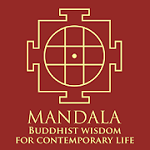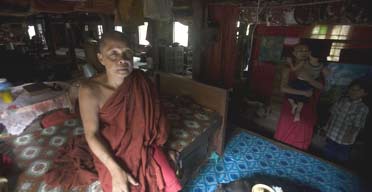
|
|
|
Home Asia Pacific South East Asia Myanmar Myanmar Protest News Spies, suspicion and empty monasteries - Burma todayby Sean Smith, The Guardian, December 15, 2007
Ten weeks after the saffron revolution was crushed, Chris McGreal sent this rare dispatch from a country gripped by fear Rangoon, Burma -- The security policemen who snatched the young shop owner from his bed and hauled him off to the bare interrogation room of Mandalay's police station No 14 really had only one question - and just one answer - in mind.
But the interrogators had an array of techniques to extract the "confession" they wanted to hear from him and the thousands of others scattered in jails across Burma; an admission that the pro-democracy demonstrations led by thousands of monks that shook the country's paranoid military government in September were really a foreign-backed political plot to bring down the regime.
"I was interrogated all night for three nights. They kicked and punched me on the side of my head with their fists. They asked me the same question over and over. I told them: you can ask anything, my answer will always be the same. I don't know who organised the monks. They didn't like that answer." So the interrogators forced the young man to half-crouch as though he were sitting on a motorbike, made him put his arms out as if gripping the handlebars and demanded he imitate an engine, loudly. The initial humiliation gave way to intense pains in his legs, arms and throat after several hours. When he fell over he was beaten again. He was held for a month and is still not sure why he was detained. He suspects the police identified him from photographs of civilians who marched with the monks. But he was not alone in the cells of police station No 14. Thousands of civilians have emerged from weeks in prison following the protests with accounts of brutal torture aimed at extracting "confessions" and at terrorising a new generation of Burmese into acquiescing to military rule. Crackdown From Rangoon to Mandalay and down the Irrawaddy river to the small town of Pakokku, demonstrators and politicians were rounded up in the crackdown against the greatest challenge to the 400,000-strong army's hegemony in a generation. Scores were killed, including monks. At the same time, hundreds of monasteries were purged of monks. Some were arrested and tortured but mostly they were driven back to their villages to prevent more protests which began over price rises but evolved into demands for an end to 45 years of military rule. What remains is a climate of terror in an already fearful land where anyone who took part in the protests lives in dread of being identified. Even the monks are suspicious of each other, believing the regime has planted spies and agents provocateurs or coerced some into becoming informers. But the military has not emerged unscathed from its confrontation with the monasteries. There are divisions over the brutal treatment of the monks, and accounts that soldiers are fearful of the spiritual price they might pay. The monks of Pakokku are wary of unknown faces. Their monasteries were among the first to be purged after the small town and seat of Buddhist learning, about six hours downriver from Mandalay, became the crucible of the demonstrations that spread nationwide. Behind closed doors inside the largest of Pakokku's monasteries, the Bawdimandine, two monks describe a confrontation with the army that on the face of it the monks have lost, but which the Buddhist clergy believe marks the beginning of the downfall of the regime - although none of them are predicting that it will happen any time soon. "All the monks here are very much against the government," said one. "They're still against the government mentally but not physically because we can't do anything. If we do they will arrest us. We don't want to kill. We don't want to torture. The government takes advantage of this. The government suppressed the protests but there's not really quiet. There's a lot of defiance." The protests began in August over fuel and food price rises but escalated in September after the army broke up a demonstration in Pakokku by shooting dead one monk and lashing others to electricity poles and beating them with rifle butts. Pakokku's monks demanded an apology from the junta and the reversal of price rises. But they added two overtly political demands - for the release of the opposition leader, Aung San Suu Kyi, from house arrest and the start of a dialogue to end military rule - that changed the character of the confrontation. When the deadline passed, monasteries across Burma took up the cause and poured tens of thousands of monks on to the streets in days of marches that initially left the military paralysed. But the crackdown soon came. In some cases it took no more than the threat of mass arrests to empty a monastery. Lorryloads of troops herded the clergy away from others. Fear of arrest Almost half of the 1,200 monks at the Bawdimandine monastery fled. Those who remain say they are afraid to venture on to the streets for fear of arrest. "Things have changed for us," said one monk. "The soldiers used to drag the civilians off the buses to check their identity cards and leave the monks in their seats. Now it is the monks they line up in the road to check and they leave the civilians on the bus." It is a similar story in monasteries from the former capital, Rangoon, to Mandalay where 20,000 monks and their supporters turned out on the streets of Burma's second city and religious heartland to challenge the military regime. The purges continue despite the government's assurances to the United Nations. "The government has many spies among the monks," said one of the chief monks of the Old Ma Soe monastery in Mandalay. "During the demonstrations they pulled the prisoners out of Mandalay jail and shaved their heads and put them among the monks to cause trouble. The bogus monks were chanting aggressively. They are still trying to send spies. When we have a new monk we do not know we test their knowledge of Buddhist literature. If they don't know we send them away." In some monasteries, the monks were given time to pack up and get out. But in others, they fled without notice, leaving neatly made beds, books lining the shelves of their cubicles and the single key that each monk is permitted to possess. Cats and dogs wander the prayer halls. Ask where the monks are and those that remain say they went back to their villages. What has happened to them there? Some were arrested but most have been left alone, provided they do not try to return to their monasteries, according to the leading clerics. "It was all about silencing them," said the monk at Old Ma Soe. Fear is pervasive in Burma. There are not many soldiers on the streets but the regime has many ordinary people believing that their every move is being watched and that anyone might be an informer. . The fear is underpinned by the sheer numbers of men who have been through the regime's jails at some time or another, even if only for a few weeks. The 1988 generation of protesters remembers the slaughter of 3,000 of their number as the regime quashed the demonstrations and the mass arrests afterwards.The latest crackdown has introduced a new generation to the regime's use of terror against its own population. "There were 85 others in my police cell, mostly young people," said the young shopkeeper held in police station No 14. "Some were only 15 or 16 years old. One boy told me he was arrested for wearing an American flag on his head. Some of the students had broken bones and head wounds. "At the end of three days I still hadn't confessed so they gave up and put me back in the cell and left me alone. Some of the others confessed under the pressure but they weren't real confessions. I don't blame them. There were people in my cell who were interrogated non-stop for 15 days." Among those detained were politicians from Aung San Suu Kyi's National League for Democracy (NLD) elected in the annulled 1990 parliamentary election. Last week, the government called diplomats to the new capital, Naypyidaw, to lay out the results of all these interrogations. The military said it had uncovered a longstanding plot involving "bogus monks", a little-known exile group, the Forum for Democracy in Burma, and billionaire financier George Soros's Open Society organisation to bring down the regime. The junta outlined a complex conspiracy to infiltrate the monasteries, the labour force and universities in an 18-page document filled with scores of names of alleged plotters and their backers. Among others, it names U Gambira, the 27-year-old leader of the All Burma Monks Alliance, who is presently locked up in Mandalay prison. The government accuses him and opposition politicians of using ordinary monks as a front for political ends. Foreign diplomats who have spoken to senior army officers since the protests say the regime is blind to the growing discontent at deepening economic hardship that underpinned the demonstrations. The government maintains the illusion that Burma's economy is growing faster than China's even though the World Bank has rubbished statistics that claim to show double-digit growth. The reality can be seen in the contrasts with the booming economies of much of the rest of south-east Asia - Thailand, Vietnam, Malaysia - particularly outside Rangoon. There's hardly a new vehicle to be seen besides scooters and Chinese-made motorbikes. The principal means of transport is old, underpowered buses and horse and trap. Ploughs are pulled by cattle. There is such a shortage of cars that 25-year-old vehicles worth a few hundred pounds across the border cost £10,000 in Burma. A Sim card for the government-run mobile phone network, the only one there is, costs about £1,000. Aside from a sprinkling of new hotels, there are few modern buildings to be seen beyond Rangoon and the surreal new capital, Naypyidaw. Life expectancy is well short of that in Burma's neighbours. The chief United Nations representative, Charles Petrie, left Rangoon last week after being expelled for a speech in which he observed that Burma's per capita gross domestic product was less than half that of Cambodia or Bangladesh, and that the recent protests "clearly demonstrated the everyday struggle to meet basic needs. The average household is forced to spend almost three-quarters of its budget on food. One in three children under five are suffering malnutrition, and less than 50% of children are able to complete their primary education". Military elite That is not the world the generals live in. They are cocooned in the new capital or Pyin U Lwin, an army town 90 minutes' drive north of Mandalay. It is home to the military's main barracks and the Defence Services Academy training base. The grand, red-tiled entrance proclaims in gold lettering that its officers are the Triumphant Elite of the Future. Two new and vast mansions sit on distant hilltops, and a neighbourhood of spacious, colonial-style homes is spreading in all directions, all apparently reserved for the military elite. Few outsiders penetrate this closed world where career officers and their families live mostly cut off from the rest of Burma. Inside that world, the junta portrays itself as all that stands between order and disintegration into ethnic conflict. It says it is committed to a roadmap to a "disciplined flourishing democracy" that will lead to a "golden land in future". But it has taken 14 years to complete the first two stages of the map which means that at the present rate of progress the end of the road will not be reached until well into the second half of the century. The military's view that it is central to Burma's very survival is displayed on the front of all the heavily censored newspapers, where each day appear the 12 "political, economic and social objectives" of the military government. These include "uplift of the morale and morality of the entire nation" and "uplift of dynamism of patriotic spirit". A senior monk who teaches at Pyin U Lwin's military academy said there was disquiet among some soldiers over the assault on the monks. "Soldiers are telling their relatives not to go into the army. Many soldiers are unhappy with what has happened. Some of them are my pupils. Even some of the colonels tell me they don't agree with what has happened," he said. "We are educating the new generation about what is right and what is wrong. Evolution is better than revolution. We have no weapons. They have the weapons. All we have is loving kindness. Who wants to be killed? People are very peaceful, very passive. No one wants to die, no one wants to kill. They are not like the Muslims. You never heard of Myanmar people suicide bombing. But it will not be quick. Maybe another 10 years." Many people in Burma are patient, but not that patient. The frustration and sense of helplessness is reflected in the self-delusion among some that the United Nations will invade and overthrow the regime. Others draw strength from the widespread practice of interpreting what are seen as auspicious signs. Near Bagan a small pagoda has become the site of pilgrimage after a colony of bees settled on the face and chest of a Buddha. Bees are considered particularly auspicious and their choice of a Buddha has been widely interpreted as siding with monks. Sitting atop a centuries-old pagoda nearby, a politician who has gone into hiding said many Burmese drew strength from the belief that the military leaders will pay for their crimes in the next life. "They will have an amazing surprise in their afterlife. By killing monks they will come back as dogs who eat shit with many diseases, not the ones that eat good food and look nice; ugly dogs," he said. There are not many who would dare say such things openly but Thet Pyin is among them. The army first threw him into prison 45 years ago for his opposition to its rule. "The problem the government has created for itself is that the conflict is no longer between the government and the people, it's between religion and the government. That's important because 80% of the population is Buddhist and the government is Buddhist. All the army is Buddhist. That will be its downfall," he said. Occupation "I'm 81 years old. I've never in all my life seen as bad a government as this, as unqualified as this. Even the Japanese occupation was not as bad as this. These military people don't have a clue what they are doing and their treatment of the monks is the latest evidence of that." Pyin, a member of a small party that won three seats in the annulled 1990 election, said that the army duped people back then with promises of democracy but that it will not be able to get away with that again. "This regime managed to pacify people after the 1988 demonstrations with promises of multiparty elections and an open economy and that the military would return to the barracks. The army reneged on that but it was forced to make the promise. The regime is going to have to do something to pacify the people again but they will not believe its promises now," he said. "There are divisions in the army. The core of the dictatorship is small, it is at odds with the military in its larger role. This government will fall." Burma's most renowned female writer, Ludu Daw Ahmar, is also outspoken against the regime. Arrested in 1978 at the age of 63 on suspicion of links to the Communist party, which she denies, Ahmar spent a year in Mandalay jail. She has just celebrated her 92nd birthday and no longer fears what the regime might do to her. Frail and hard of hearing, she remains vigorously defiant. "People are very much afraid of the government but this can't go on forever. There will be a day when the people break this," she said. "People will have to sacrifice their lives. There is no choice. We can't go on like this. We must get arms to resist them. I can't say how, but the people must find arms." That is not the view of most Burmese, or the monks who have taken up a low-key but symbolically significant protest against the regime by refusing alms from the government. Some monks turn their bowls upside down when offered food by soldiers, interpreted as a form of excommunication. At the Old Ma Soe monastery the monks refused to invite government representatives to celebrations to mark its 100th anniversary. The clerics have also declared a boycott of government exams they are expected to take every year. But the monasteries hold their own exams in April, and some senior clerics are predicting that will mark the beginning of a new campaign of protest. "The monasteries will be full again. They will not be silent. No one has changed their mind about this government," said a senior cleric in Mandalay. "But we know it will not change tomorrow. It might take five years, it might take 10, but it will be go. It has no solutions." Atop the pagoda near Bagan, the political activist who is now in hiding said the military was wrong to believe it has cowed another generation. "Nobody won in September because it's not finished," he said. Resource-rich but with faltering economy Burma is a resource-rich country but its economy is crippled by overbearing government control and ineffective policies. It is the world's biggest exporter of teak, a principal source of precious stones, has fertile soil and significant offshore oil and gas deposits but the majority of its people live in abject poverty. Steps in the early 1990s to liberalise the economy after decades of failure under the programme Burmese Way to Socialisation, a large-scale attempt at central economic planning, were largely unsuccessful. The US imposed fresh economic sanctions in August 2003 in response to the junta's attack on Aung San Suu Kyi and her convoy. A banking crisis in the same year saw hundreds of Burmese lining up outside banks to withdraw their savings after the government shut down several institutions. The average household spends three-quarters of its budget on food and one in three children under five are suffering malnutrition. |
 Get your Korean Buddhist News here, brought to you by BTN-Buddhist Channel |
 |
 The Mandala app brings together Buddhist wisdom and meditation techniques with the latest insights of psychology and neuroscience to handle the challenges and complexities of modern life. The App offers a series of engaging talks and conversations with experts on a wide variety of topics, such as managing stress, dealing with adversity, developing greater resilience, cultivating empathy and compassion, creating healthy relationships, and many more. These topics are explored to help find greater peace, meaning and joy in our lives. Our panel of experts include Dr, Thupten Jinpa, Daniel Goleman, Kelly McGonigal and others.FREE DOWNLOAD here |
| Point
your feed reader to this location |
| Submit an Article |
| Write to the Editor |

 << Burma monks
<< Burma monks